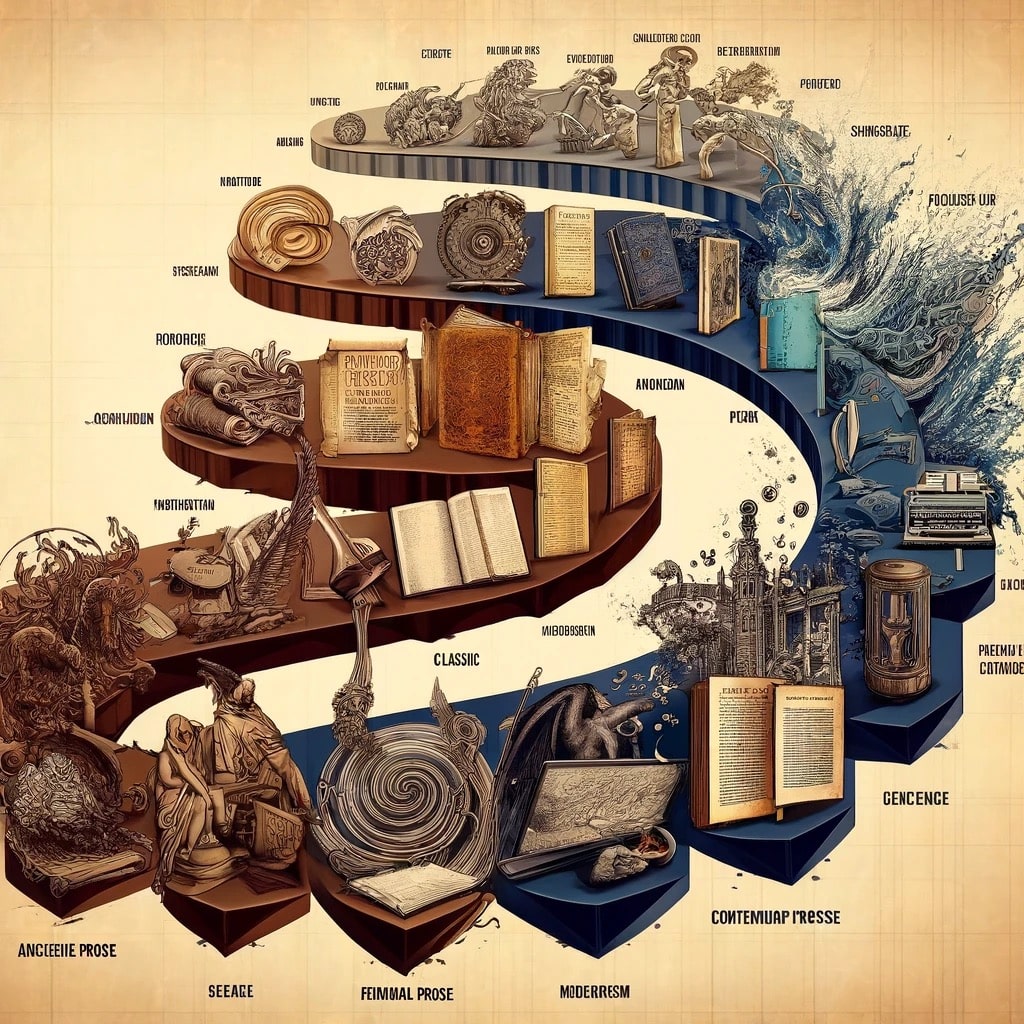Prose

Prose, as an art form, spans a vast and rich history, evolving through various cultural, historical, and philosophical landscapes to become a versatile medium for storytelling, expression, and exploration of human experiences. Over the centuries, prose has transformed and adapted to fit society’s changing needs and tastes, reflecting the shifting ideologies and values of different eras. From ancient epics and myths to modern novels and essays, the evolution of prose mirrors the evolution of humanity itself, capturing the essence of our collective consciousness and individual journeys. Through prose, we can delve into the depths of the human psyche, unraveling complex emotions and thoughts, and connecting with others profoundly. As a timeless and universal form of artistic expression, prose inspires, challenges, and illuminates the human experience in all its complexity and beauty.
Historical Evolution:
- Ancient Prose: The roots of prose can be traced back to ancient civilizations like Mesopotamia, Egypt, and Greece. Early prose was utilitarian and used for laws, historical records, and philosophical discourses. Philosophical works, particularly in ancient Greece with texts by Plato and Aristotle, showcased prose as a tool for complex argumentation and exploration of ideas.
- Medieval Prose: During the medieval period, prose narratives began to gain prominence alongside religious and philosophical texts. This era saw the blending of oral storytelling traditions with written prose, leading to the creation of epic narratives and legends, often infused with moral and religious undertones.
- Renaissance and Enlightenment: The Renaissance and Enlightenment periods marked a significant shift, with prose becoming a prominent medium for exploring humanism, science, philosophy, and political theory. The novel as a form began to take shape, offering a new way to explore character, psychology, and society.
- 19th Century: The 19th century is often heralded as the golden age of the novel. Writers like Jane Austen, Charles Dickens, and Leo Tolstoy mastered the art of prose, using it to critique social norms, explore human psychology, and depict intricate narratives. The period also saw the rise of the short story as a distinct form.
- Modernism: The 20th century introduced modernism, where writers like James Joyce and Virginia Woolf experimented with stream of consciousness, non-linear narratives, and fragmented structure, pushing the boundaries of prose to reflect the complexities and uncertainties of the modern world.
- Postmodernism and Contemporary Prose: Postmodernism further challenged traditional narrative structures, playing with metafiction, intertextuality, and unreliable narration. Contemporary prose continues to evolve, embracing diverse voices and perspectives, and adapting to digital formats, while still exploring the fundamental aspects of human experience.
Artistic Significance:
Prose as an art form provides a captivating and expansive canvas for writers to immerse themselves in the complexities of human existence, the intricate web of societal structures, and the profound depths of the human mind. It not only serves as a platform for intricate narrative development but also as a tool for deep and layered character exploration. Furthermore, prose enables the seamless interweaving of a myriad of diverse themes and perspectives, creating a rich tapestry of storytelling that reflects the multifaceted nature of the human experience.
- Character and Plot: Unlike other literary forms, prose provides the space to develop complex characters and intricate plots, offering readers a deep dive into the experiences and transformations of individuals and their worlds.
- Exploration of Ideas: Prose serves as a medium for philosophical, ethical, and existential exploration, allowing writers to dissect ideas and present them through the lens of narrative.
- Reflecting Society: Through the ages, prose has been a mirror to society, reflecting cultural, social, and historical contexts, often critiquing and challenging prevailing norms.
- Innovation and Experimentation: Each era brings new styles and approaches to prose, from the serialized novels of the 19th century to the digital narratives of today. Writers experiment with voice, structure, and narrative techniques to continually redefine what prose can be.
In summary, prose as an art form is a dynamic and evolving medium that has been instrumental in shaping and reflecting human culture throughout history. It remains a foundational pillar of literary expression, continually adapting to capture the essence of the human experience in an ever-changing world.
QUESTIONS FOR FURTHER DISCUSSION
Certainly! Here are some thought-provoking questions to further explore the topic of prose and its evolution:
- Historical Context and Influence: How have major historical events and societal changes influenced the evolution of prose over the centuries? Can you identify specific instances where historical context significantly shaped prose styles or themes?
- Cultural Variations: How does prose differ across cultures, and what factors contribute to these differences? How do cultural contexts shape narrative styles, themes, and the purpose of prose in various societies?
- Genre Evolution: How have different genres within prose (like the novel, short story, and essay) evolved over time? What factors have driven changes in these genres, and how have they influenced each other?
- Technological Impact: How has the advancement of technology, especially the digital revolution, impacted the way prose is written, published, and consumed? Do you think the essence of prose has changed with the advent of digital media?
- Authorial Voice and Perspective: How have changes in authorial voice and perspective reflected broader shifts in culture and society? How has the diversity of voices in contemporary prose enriched the art form?
- Future of Prose: With the ongoing advancements in AI and digital platforms, what future transformations do you foresee for prose as an art form? How might it adapt to new mediums and audience expectations?
- Reader Engagement: How have readers’ expectations and engagement with prose evolved over time? How do contemporary readers interact with prose differently compared to readers in the past?
- Literary Theory: How have different literary theories and critical approaches influenced the creation and interpretation of prose? How might these theories evolve in the future?
- Cross-Media Influence: How has prose influenced, and been influenced by, other art forms such as film, theater, and visual arts? What are some notable examples of this cross-media influence?
- Ethics and Responsibility: What responsibilities do authors of prose have in shaping societal norms and values? How has this responsibility evolved, and what should it look like in the future?
These questions can lead to rich discussions, offering deeper insights into the complexities and dynamics of prose as a vital component of human expression and communication.
© 2024, wcadmin. All rights reserved, Writers Critique, LLC Unless otherwise noted, all posts remain copyright of their respective authors.





The evolution of prose styles over the centuries has been deeply influenced by historical events and societal changes. Here’s a detailed look at some specific instances where historical contexts significantly shaped prose styles and themes:
1. Medieval to Renaissance Periods
During the Middle English period, literature transitioned from religious themes to more secular works. Figures like Geoffrey Chaucer and Thomas Malory contributed to shaping prose during this time, focusing on both religious and secular narratives (e.g., “Piers Plowman” and “Sir Gawain and the Green Knight”). The Renaissance period, influenced by the printing press, led to the English Renaissance, which saw a surge in literature that delved into humanism, classical influences, and a break from medieval mysticism.
2. The 19th Century: Realism, Naturalism, and Social Change
The 19th century was a period of tremendous change, marked by the Industrial Revolution, urbanization, and scientific advancements. This era saw the rise of literary realism, which rejected romanticism in favor of depicting everyday life and social conditions in a more objective light. Authors like Thomas Hardy and Gustave Flaubert portrayed the complexities of human existence through detailed descriptions and nuanced characterizations. The introduction of scientific theories into literature also contributed to the naturalist movement, which examined how heredity, environment, and social determinism shaped human behavior.
Notable 19th-century authors such as Jane Austen, Charles Dickens, and George Eliot used their prose to explore themes of social class, morality, and human nature. Dickens, in particular, combined social criticism with storytelling, bringing to light the struggles of the working class during Victorian England.
3. Classic to Modern Prose
Classic literature, like Jane Austen’s “Pride and Prejudice” and Charles Dickens’ “A Tale of Two Cities,” employed narrative techniques such as omniscient viewpoints and free indirect discourse. These styles allowed deeper engagement with characters’ inner worlds and reflected societal norms of the time. As we moved into modern prose, writers like Virginia Woolf used stream-of-consciousness techniques to delve into characters’ thoughts, reflecting the fragmented nature of the modern era.
Contemporary prose often embraces a conversational tone and a more inclusive vocabulary, catering to modern audiences and influenced by technology and changing reading habits. Authors like Ernest Hemingway, with his minimalist prose style, broke from ornate descriptions in favor of simplicity and directness, reflecting the evolving literary landscape.
4. Modernism and Postmodernism
The Modernist movement (1890-1950) emerged as a response to the rapid industrialization and social changes of the 20th century. Writers like T.S. Eliot, Virginia Woolf, and James Joyce experimented with narrative techniques, focusing on themes of alienation and disillusionment. This movement was also a reaction to the devastation of World War I, which created a sense of skepticism toward traditional narratives and values.
Postmodernism, which followed Modernism, continued to challenge established literary forms, often embracing paradox, fragmented narratives, and a sense of ambiguity. This period reflects the complexities and uncertainties of the modern world.
5. Prose as a Reflection of Societal Change
Across different eras, prose has adapted to reflect cultural, technological, and ideological shifts. For instance, transcendentalism in the 19th century focused on universal themes like the inherent goodness of people, emerging as a reaction to the formalism of religious customs.
Similarly, literary realism and naturalism portrayed the everyday lives and struggles of common people, influenced by the challenges brought about by industrialization, urbanization, and scientific theories.
Key Takeaways
Classic Literature: Marked by detailed descriptions, social commentary, and structured narrative techniques.
19th Century Realism/Naturalism: Focused on portraying life as it truly was, often highlighting social issues like poverty, inequality, and the human condition.
Modernism: Introduced fragmented narratives and stream-of-consciousness techniques, reflecting the alienation and complexities of the 20th century.
Contemporary Prose: Often employs a more conversational tone and minimalistic style, shaped by technology and changing reading habits.